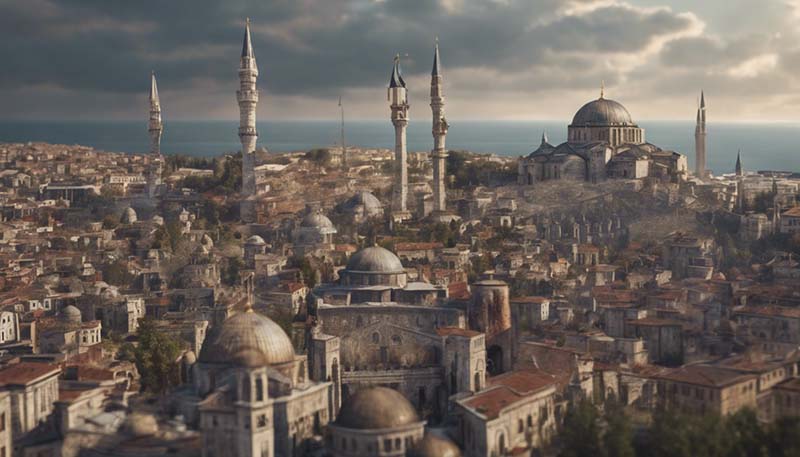The Fall of Constantinople: The End of the Byzantine Empire
The fall of Constantinople on May 29, 1453, marked a significant turning point in world history. It was the final act that brought the curtain down on the Byzantine Empire, a beacon of Roman legacy that had endured for over a millennium. The city\'s fall to the Ottoman Turks had profound implications for the political, cultural, and religious landscape of Europe and the Middle East.
**Historical Context**
The Byzantine Empire, also known as the Eastern Roman Empire, was the continuation of the Roman Empire in its eastern provinces during Late Antiquity and the Middle Ages. It was distinguished for its fusion of Roman political institutions with Greek cultural and Christian religious practices. The capital, Constantinople (present-day Istanbul), was a thriving metropolis and a center of trade, diplomacy, and learning.
**The Rise of the Ottoman Empire**
The Ottoman Empire emerged as a formidable power in the late 13th and early 14th centuries. Under the leadership of Osman I and his successors, the empire expanded rapidly, conquering significant territories in Asia Minor and the Balkans. By the mid-15th century, Constantinople found itself encircled by Ottoman territories, making it an isolated island of Christianity in a sea of Islamic states.
**The Siege of Constantinople**
The final siege of Constantinople was orchestrated by the ambitious Ottoman Sultan Mehmed II, who was determined to capture the city and make it the capital of his empire. He prepared meticulously for the siege, amassing a large army and building a significant fleet. The Byzantines, under Emperor Constantine XI, knew that their time was running out, but they were determined to defend their city to the last man.
Advertisement
**Military Tactics and Strategies**
The siege was characterized by a series of innovative military tactics. Mehmed II employed heavy artillery, including the infamous \"Basilica,\" a massive bombard capable of firing stone balls that could breach the city\'s formidable walls. The Byzantine defenders, on the other hand, relied on a combination of traditional land and naval defenses, including the city\'s triple-layered walls and the famous Greek fire, a weapon that projected an ignited liquid that could burn on water.
**The Role of Betrayal and Espionage**
The fall of Constantinople was not solely due to military might. Betrayal and espionage played a crucial role in the city\'s downfall. It is believed that the Ottomans managed to infiltrate the city\'s defenses, and a small gate left open by a disgruntled defender allowed the Turkish forces to enter the city. The element of surprise and the swift movement of the Ottoman troops turned the tide of the battle.
**The Aftermath**
The fall of Constantinople signaled the end of the Byzantine Empire and the beginning of a new era in the region. The city was renamed Istanbul, and it became the new capital of the Ottoman Empire. The Hagia Sophia, once a Christian cathedral, was converted into a mosque, symbolizing the shift in power and the dominance of Islam in the region.
**Cultural and Religious Impact**
The fall of Constantinople had a profound impact on the cultural and religious landscape of Europe. It led to a massive influx of Greek scholars and texts into Western Europe, contributing to the Renaissance. The city\'s libraries were plundered, and many ancient texts were lost or destroyed. The fall also marked the end of a significant center of Eastern Orthodox Christianity, which had long-standing theological and political differences with the Roman Catholic Church.
**Legacy and Historical Significance**
The fall of Constantinople is remembered as a pivotal moment in history. It marked the end of the last remnant of the ancient Roman Empire and the rise of the Ottoman Empire, which would go on to become a dominant power in the 16th and 17th centuries. The event is also seen as a turning point in the balance of power between the Islamic East and the Christian West.
**Conclusion**
The fall of Constantinople was a complex event with far-reaching consequences. It was a result of military strategy, cultural clashes, and political maneuvering. The city\'s fall changed the course of history, affecting the development of Europe, the Middle East, and the world at large. Today, it serves as a poignant reminder of the transient nature of power and the enduring legacies of empires.
